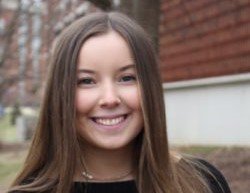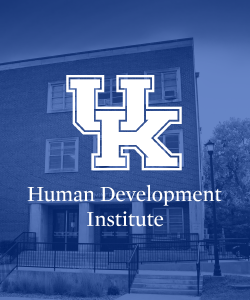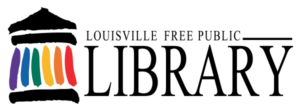UK junior Ellie Fahey was looking for a note to get out of class when she happened upon the Human Development Institute’s Universal Design Program.
Ellie explained, “I got a notification through the College of Health Sciences about the Special Olympics med event that they do every year and it was conflicting with one of my classes, so I was trying to see if I could get an excuse note so I could go [volunteer].”
MedFest offers the physical exam that all athletes need to participate in Special Olympics sports and is led by volunteer physicians, nurses, physician assistants, and medical students.
While trying to get her excuse note, Ellie expressed how passionate she is about working with people with disabilitiesand was referred to HDI because of her interest. She said, “It was kind of by chance that I even heard of it, but then once I started talking to people in HDI, I just took my first class [in Universal Design], and now I’ve decided to continue on with it and I really like it.”
In addition to the certificate program, Ellie is studying Human Health Sciences with a minor in health promotion and started working as a research assistant. Her next course in the Universal Design program is a practicum that she is doing with HDI’s Kentucky Inclusive Health Collaborative team.
Part of her practicum experience will involve working on awomen’s health project with women with disabilities. Ellie explained that “they don’t get breast cancer and cervical cancer screenings as frequently as people without disabilities, so we’re trying to figure out why.” Next steps will include overcoming barriers, encouraging screenings, and getting patients seen.
Ellie added, “Their rates [of these cancers] are higher and that’s just obviously not okay.” She has already applied some Universal Design principles to the project by using plain language in project documents.
When asked about her perspective on Universal Design Ellie said, “A lot of people think Universal Design is for people with disabilities… But I think it’s more like designing the world so it’s accessible for everybody, so we don’t have to necessarily have special things for people… [It’s] offering differentiation in the world to make it the best for everybody.”
Ellie plans to go into healthcare as a physician’s assistant working with underserved populations. She sees Universal Design as a way to make healthcare more accessible by using the plain language in health-related communication.
She said, “I think it’s super important to draw attention to what needs to be done to keep your body healthy. The Wellness Wednesdays that our team does, I think that those are really awesome… they’re always really informative, and teaching people about their health in a way that’s understandable to them is the most important thing.”
Ellie went on to describe how this approach will apply to her work:
As a future provider, what I want to do for my patients is to teach them about their health so that they can take control of their own health and be educated and empowered in their own bodies… I’d rather every patient be a part of the conversation and make sure they really understand what’s going on with their body and how we’re planning to help it get better. And I think Universal Design is a big part of that… because everyone has different backgrounds and different health, and everyone should be able to have the ability to understand what’s going on with their body… I think I’ll have a unique perspective going into healthcare fields with this Universal Design background and really focusing on each patient as an individual.
While shadowing healthcare professionals, Ellie noticed how important work is, for people with and without disabilities.She said, “When we take that opportunity away from people with disabilities, I feel like it kind of isolates them from society in a way.”
To support giving people that opportunity, Ellie is helping with fundraising and promotion for a nonprofit called Gerry’s Café in her hometown of Arlington Heights, Illinois.The café will employ young people with intellectual and developmental disabilities.
During high school in Illinois, Ellie worked with people with disabilities in a career life skills program. She said, “I just loved it and it was the best part of my day, every day… I really love talking to them. It was just like an instant connection… and then I just never stopped from there… I still have my students FaceTime me all the time.”
Ellie’s research assistantship at HDI and her studies in Universal Design are a way to continue what she started in high school. “I’m really grateful to be a part of the women’s health team… and I’m really excited to see where that project goes,” she said. “I’m really glad I found this, and it was totally by chance that I even heard of it, so I’m really excited to keep going.”
For more information on HDI’s Universal Design Certificate, click this link:
https://hdi.uky.edu/wp-content/uploads/2020/05/Undergrad-Certificate-One-Pager.pdf.
Article written by Amanda Corbin.



